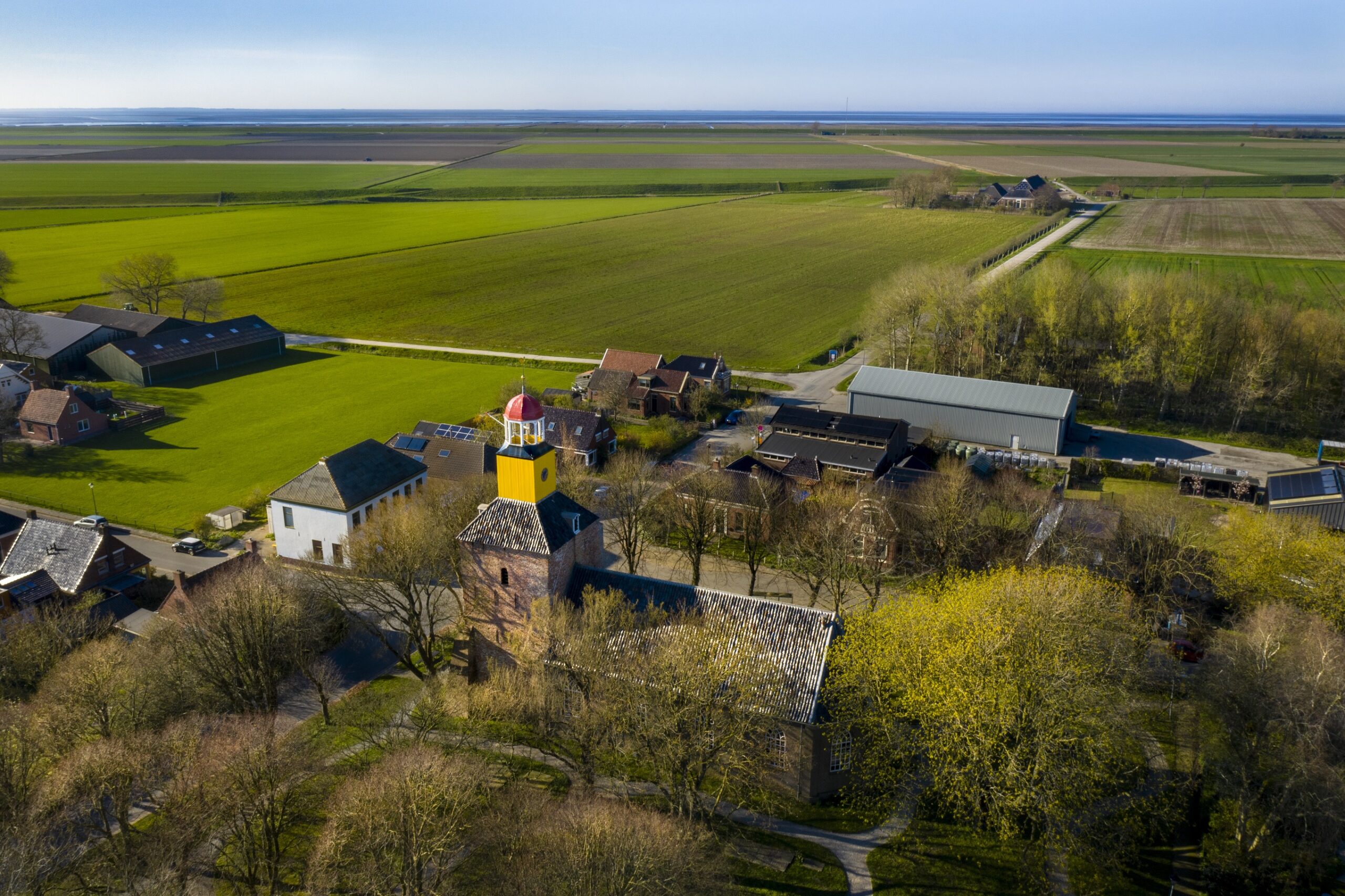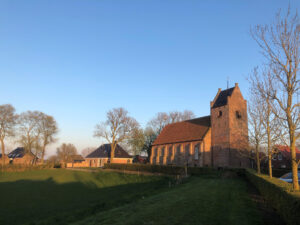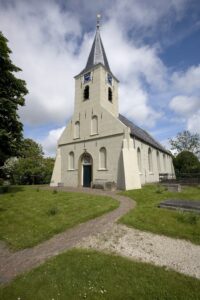
Church of Hornhuizen. Photo: Gert Brauns (bureaubrauns).
The edge of the Wadden Sea houses beautiful and historically significant churches. The churches, rising majestically above the flat coastal landscape, have long served as beacons for fishermen and as alternative lighthouses along the coast. They still form powerful visual beacons in the landscape, embodying the collective identity, worship, and sense of community for those who call this region home.
The Ziltepad (Salty Path) allows a unique experience of this rich religious heritage and its interaction with the physical environment through a walking and cycling route. The project is a collaboration between The Groningen Historic Churches Foundation (nowadays called Groningen Churches) and The Old Frisian Churches Foundation. The aim is to stimulate sustainable and spiritual tourism that uplifts the local community and respects and celebrates the UNESCO Wadden Sea’s authentic cultural heritage and environment.
In September and October 2023, the first participants will explore the route in a pilot project.
Multifaceted experience of historically significant churches in their environment
The guided trail offers walkers and cyclists a unique experience of a rich cultural and natural landscape. The pilot route runs through the provinces Groningen and Friesland; it has three stages with an average length of 17 kilometres. It passes along the beautiful churches of Oostrum, Vierhuizen and Hornhuizen, located in the heart of idyllic villages. Over the next two years, the path in Groningen and Friesland will be expanded and extended to Noord-Holland, eventually including 12 to 15 churches.
Each church tells unique stories through its interior and exterior – religious, local, and global. We invite participants to experience these captivating stories as they unfold within the church walls and their surroundings. The churches are open daily from March 1 to the end of October. There is always the possibility of entering the church with a key that can be obtained from a friendly neighbour.
The stories of the churches will be brought to life through engaging podcasts. The pilot brings the story of the church of Oostrum, weaving together interviews, historical sound fragments, stories, and myths. This innovative approach aims to captivate seasoned enthusiasts and ignite the curiosity of younger generations, fostering a sustainable future for our religious heritage.

Church of Oostrum.
Traversing the path on foot or by bike invites participants to slow down and become still. This creates a sense of ‘timelessness’ and heightened awareness, allowing an optimal experience of the churches and their interaction with the environmental elements of the Wadden Sea. Activities related to mind and body, church and landscape enrich and deepen the journey. They revolve around four themes: Life and Experience, Exercise and Health, Nature and Sustainability and Social engagement. A dedicated walking and cycling guide by Fokko Bosker guarantees that people do not lose their way or miss out on relevant information.
Spiritual and sustainable tourism

Church of Vierhuizen, the Netherlands.
The Groningen Historic Churches Foundation and The Old Frisian Churches Foundation respond to the growing demand for sustainable forms of tourism, such as spiritual tourism. With its picturesque churches, enchanting villages, and a perfect blend of peace, space, and nature, the Wadden Sea region holds immense potential for developing this type of tourism. Spiritual or ‘slow’ tourism caters to those seeking meaningful experiences, quiet reflection, authenticity, and a deep sense of connection. It is a niche market that values quality over quantity, drawing in individuals who yearn for moments of stillness and self-reflection amidst the chaos of modern life and people who are curious about history, culture, and the natural world.
Currently, spiritual tourism is a niche market we know very little about. Therefore, with this pilot project, we aim to learn from and about this target audience. Results will be carefully evaluated and generously shared.
As they traverse along The Ziltepad, walkers and cyclists become like modern-day pilgrims, embarking on a journey inspired by a vocation. This contemporary take on the concept of pilgrimage underscores religious heritage’s invaluable role in nurturing sustainable tourism and supporting local economies.
Valuable tourism and local communities
We aim to cultivate sustainable and responsible tourism that benefits the local environment and communities. We weigh tourism’s environmental, social and economic impacts and seek to minimise adverse effects while maximising positive contributions to the local community, culture, and environment. These contributions are not only social and environmental but also economic. We aim to generate income and increase and preserve job opportunities, local services and products by attracting more valuable tourists and tempting them to prolong their stay. By doing so, we also aim to inspire young people to stay in or return to rural communities and become involved in the management and future development of their religious heritage.
The Ziltepad actively involves local villagers and communities through small-scale initiatives supplementing tourist facilities. These initiatives ensure that the economic benefits remain within the community, foster social cohesion, and create immersive experiences. They promote meaningful interactions between residents and participants, forging connections and authentic experiences that transcend mere commercial tourism. Imagine a local luggage transport service or enjoying a homecooked meal at the house of a local or in the local church. As night falls, people can head to cosy hotels and B&Bs, but they may also choose to spend the night in villagers’ homes or in the church, adding to the pilgrimage experience.
Sponsors
The Ziltepad is made possible in part by the Netherlands Board of Tourism & Conventions (NBTC), Wadden fund, Province of Fryslân, Province of Groningen, Mondriaan fund, QOP Acceleration Agenda, and Foundation Vrienden op de Fiets (Friends on Bikes).
By Lisa Swaving, historian, Communication & PR The Ziltepad





Follow us: